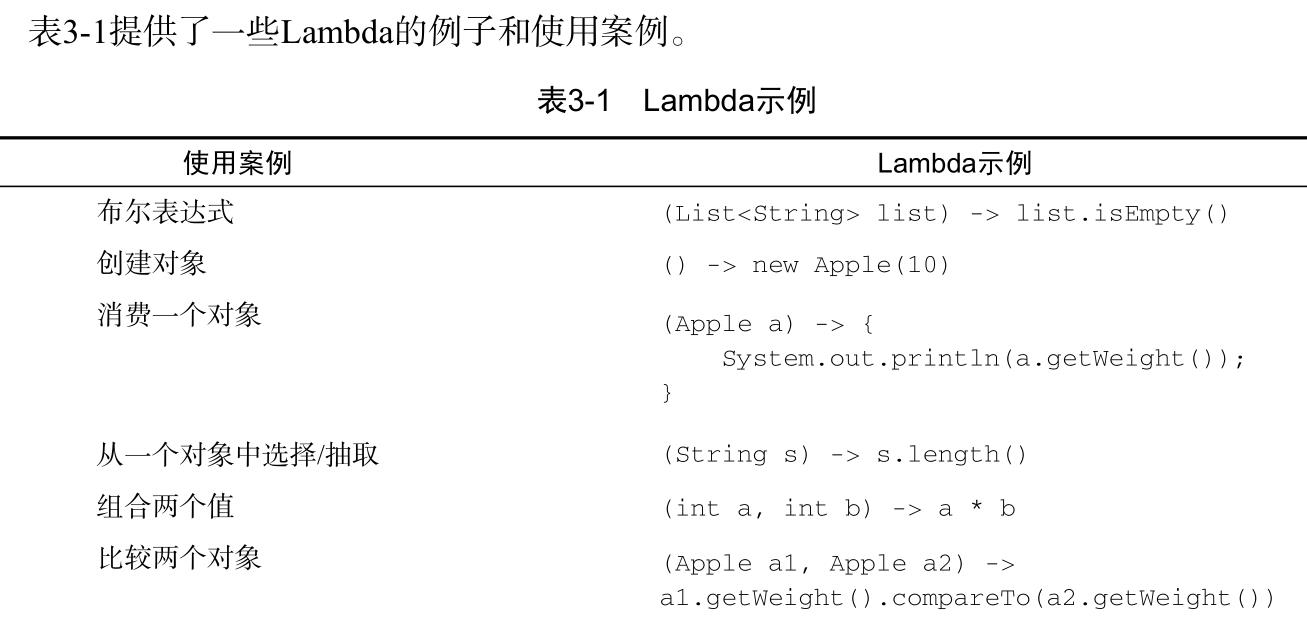Java8的学习使用
Posted 陆伟
tags:
篇首语:本文由小常识网(cha138.com)小编为大家整理,主要介绍了Java8的学习使用相关的知识,希望对你有一定的参考价值。
一:lambda表达式的使用。

1:只有在需要函数式接口的时候才可以传递Lambda
函数式接口就是只定义一个抽象方法的接口。
1 package com.company; 2 3 import java.util.ArrayList; 4 import java.util.Arrays; 5 import java.util.List; 6 import java.util.function.BiFunction; 7 import java.util.function.Function; 8 import java.util.function.Predicate; 9 import java.util.function.Supplier; 10 11 public class FilteringApples { 12 // 定义一个苹果类 13 public static class Apple{ 14 private int weight = 0; 15 private String color = ""; 16 17 //空参构造器 18 public Apple(){ 19 } 20 //一个参数的构造器 21 public Apple(int weight) { 22 this.weight = weight; 23 } 24 //两个参数的构造器 25 public Apple(int weight, String color){ 26 this.weight = weight; 27 this.color = color; 28 } 29 30 31 public Integer getWeight() { 32 return weight; 33 } 34 35 public void setWeight(Integer weight) { 36 this.weight = weight; 37 } 38 39 public String getColor() { 40 return color; 41 } 42 43 public void setColor(String color) { 44 this.color = color; 45 } 46 47 public String toString() { 48 return "Apple{" + 49 "color=\'" + color + \'\\\'\' + 50 ", weight=" + weight + 51 \'}\'; 52 } 53 } 54 //测试 55 public static void main(String ... args) { 56 57 int portNumber = 1337; 58 Runnable runnable = () -> System.out.println(portNumber); 59 System.out.println("runable:"+runnable.toString()); 60 //利用空参构造器 61 Supplier<Apple> supplier = Apple::new; 62 Apple apple = supplier.get(); 63 //一个参数的构造器 64 Function<Integer, Apple> function = Apple::new; 65 Apple apply = function.apply(100); 66 //两个参数的构造函数 67 BiFunction<Integer, String, Apple> aNew = Apple::new; 68 Apple green = aNew.apply(90, "green"); 69 System.out.println(green); 70 71 List<Apple> inventory = Arrays.asList(new Apple(80,"green"), 72 new Apple(155, "green"), 73 new Apple(120, "red")); 74 75 // [Apple{color=\'green\', weight=80}, Apple{color=\'green\', weight=155}] 76 //查询为绿色的苹果 77 List<Apple> greenApples = filterApples(inventory, FilteringApples::isGreenApple); 78 System.out.println(greenApples); 79 80 // [Apple{color=\'green\', weight=155}] 81 // 查询重量超过150的苹果 82 List<Apple> heavyApples = filterApples(inventory, FilteringApples::isHeavyApple); 83 System.out.println(heavyApples); 84 85 // [Apple{color=\'green\', weight=80}, Apple{color=\'green\', weight=155}] 86 // Java8 Lambda表达式 查询颜色为绿色的苹果。 87 List<Apple> greenApples2 = filterApples(inventory, (Apple a) -> "green".equals(a.getColor())); 88 System.out.println(greenApples2); 89 90 // [Apple{color=\'green\', weight=155}] 91 // Java8 Lambda表达式 查询重量超过150的苹果 92 List<Apple> heavyApples2 = filterApples(inventory, (Apple a) -> a.getWeight() > 150); 93 System.out.println(heavyApples2); 94 95 // [Apple{color=\'green\', weight=155}] 96 //查询苹果重量大于150,颜色也为绿色的。 97 List<Apple> weirdApples = filterApples(inventory, (Apple a) -> a.getWeight() >150 && 98 "green".equals(a.getColor())); 99 System.out.println(weirdApples); 100 } 101 102 //以前的需求写法:查询集合中为 green的苹果 103 public static List<Apple> filterGreenApples(List<Apple> inventory){ 104 List<Apple> result = new ArrayList<>(); 105 for (Apple apple: inventory){ 106 if ("green".equals(apple.getColor())) { 107 result.add(apple); 108 } 109 } 110 return result; 111 } 112 //以前的需求写法:查询重量超过150g的苹果 113 public static List<Apple> filterHeavyApples(List<Apple> inventory){ 114 List<Apple> result = new ArrayList<>(); 115 for (Apple apple: inventory){ 116 if (apple.getWeight() > 150) { 117 result.add(apple); 118 } 119 } 120 return result; 121 } 122 123 //对上面的进行代码修改。上面的需求代码基本一样。把重复使用的给优化一下。 124 public static boolean isGreenApple(Apple apple) { 125 return "green".equals(apple.getColor()); 126 } 127 128 public static boolean isHeavyApple(Apple apple) { 129 return apple.getWeight() > 150; 130 } 131 //Predicate 这里使用了策略模式。定义一族算法,把它们封装起来(称为“策略”),然后在运行时选择一个算法 132 public static List<Apple> filterApples(List<Apple> inventory, Predicate<Apple> p){ 133 List<Apple> result = new ArrayList<>(); 134 for(Apple apple : inventory){ 135 if(p.test(apple)){ 136 result.add(apple); 137 } 138 } 139 return result; 140 } 141 142 }
以上是关于Java8的学习使用的主要内容,如果未能解决你的问题,请参考以下文章